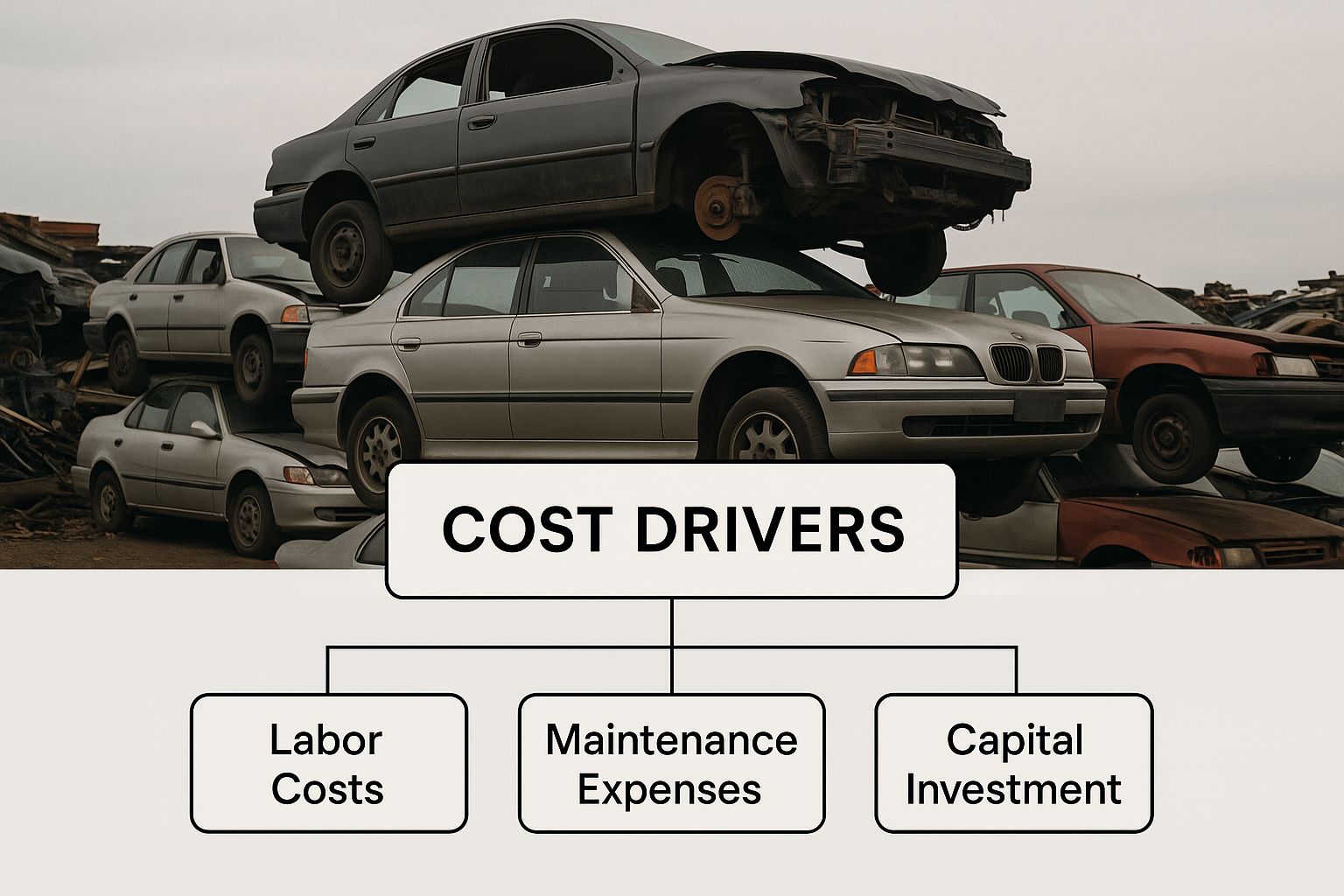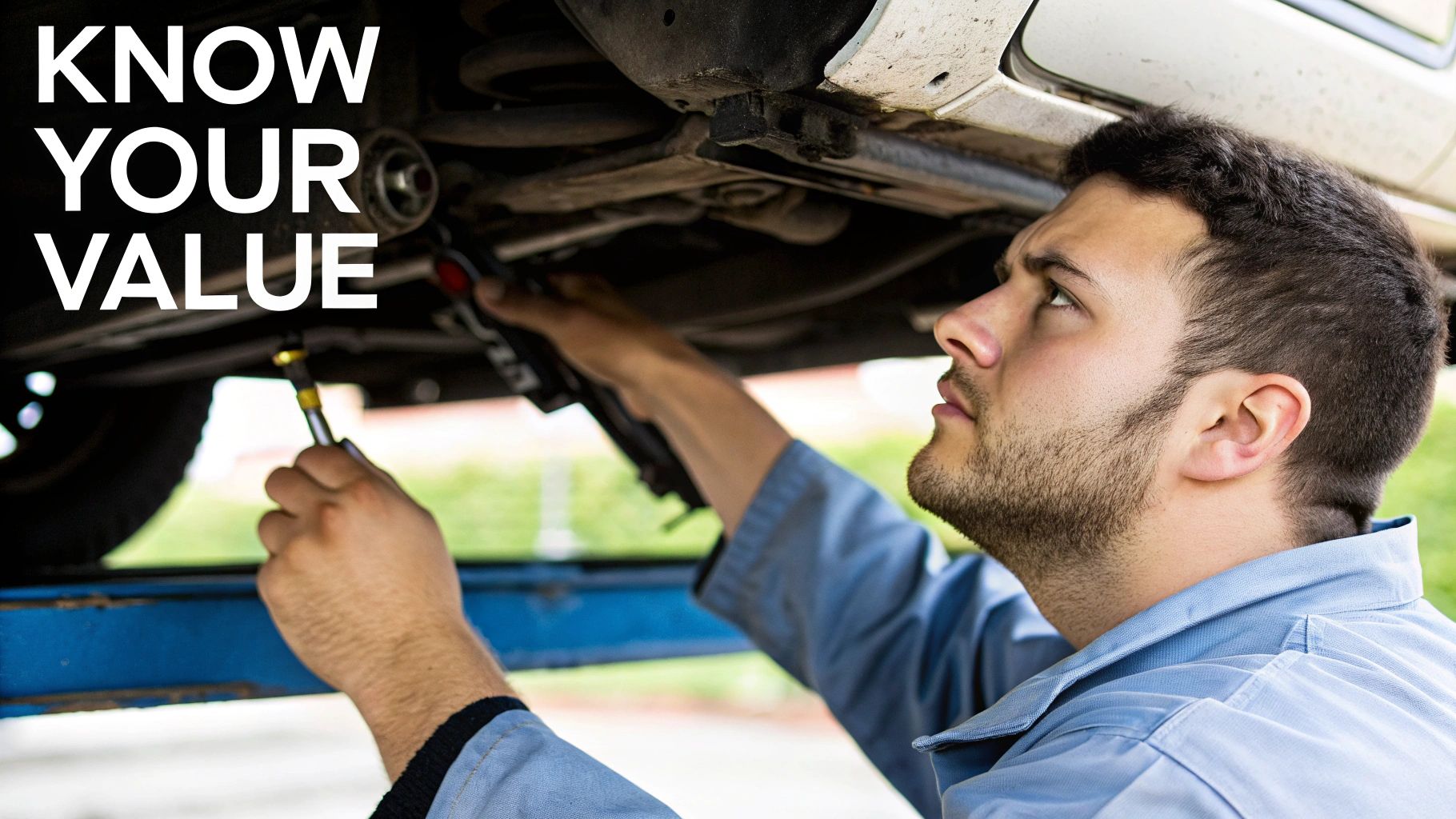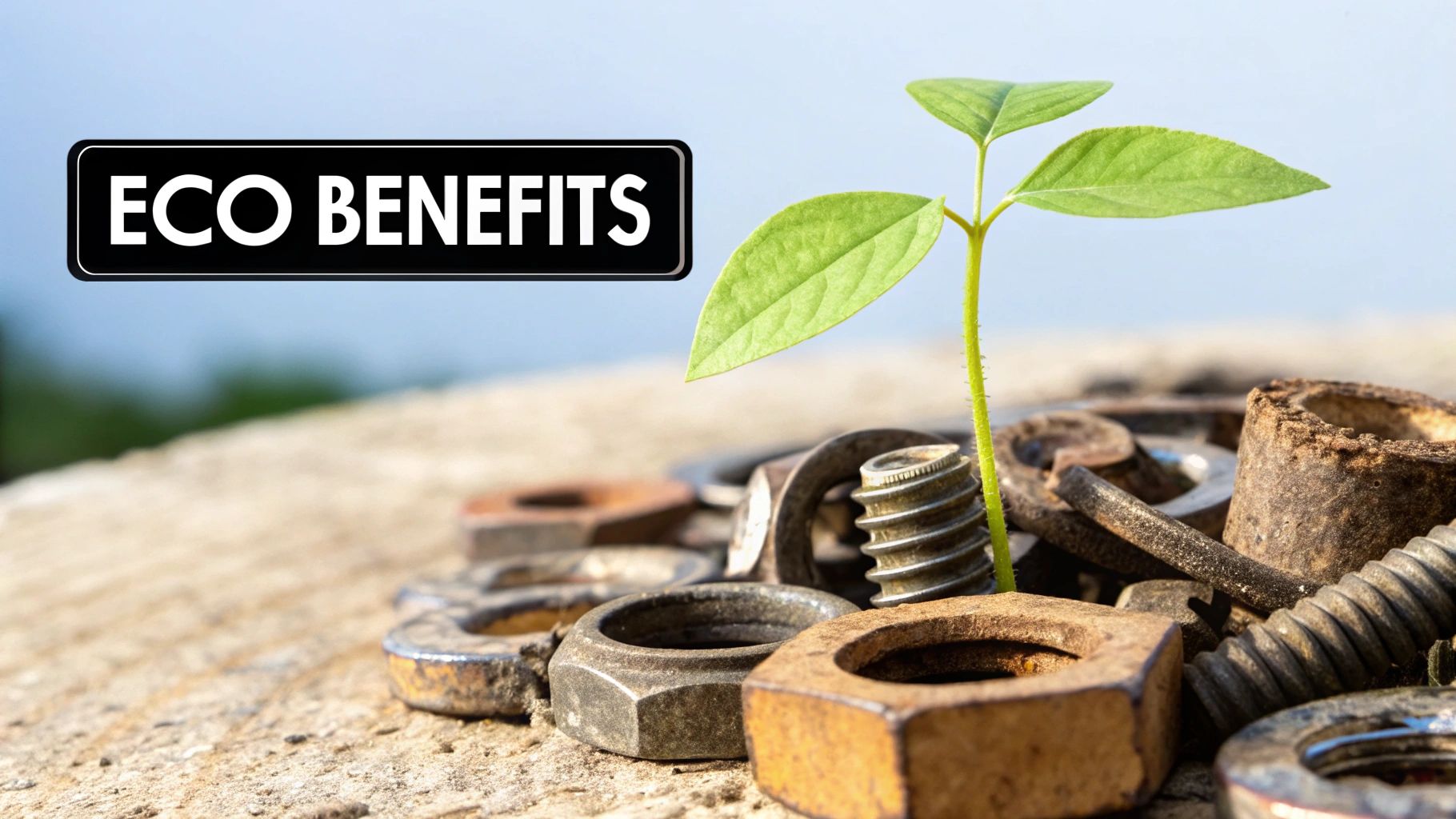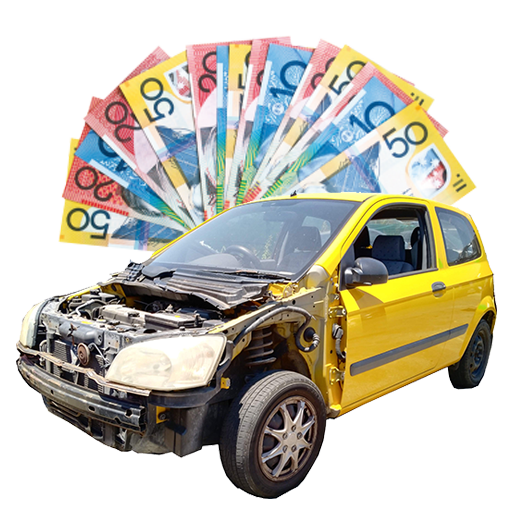So, how much cash can you actually get for that old car rusting in your driveway? In Australia, the scrap car cost can be anywhere from $200 for a small, stripped-out vehicle to well over $1,500 if it's a heavier, complete car. What you're offered really boils down to three key things: the car's weight, the condition of its valuable parts, and what recycled metals are worth on the day.
What Determines Your Payout
When you're scrapping a car, it's helpful to stop thinking of it as a vehicle and start seeing it as a stockpile of valuable resources. Its worth isn't in its ability to get you from A to B anymore; it's in the raw materials packed inside it. A car buyer isn't interested in its logbook or how well it was serviced. They're looking at its weight in steel, what parts can be salvaged, and whether it's all there.
Understanding what they're looking for is the key to getting a fair price. It's a simple shift in perspective that puts you in a much better position to negotiate.
The Core Valuation Factors
At the end of the day, three main things drive the quote you'll get for your end-of-life car:
- Vehicle Weight and Size: This is the big one. A hefty ute or a large SUV has a lot more metal than a small hatchback, making it instantly more valuable to a recycler. More metal equals more money, plain and simple.
- Completeness of the Vehicle: A car that still has its engine, transmission, and catalytic converter is worth significantly more than a hollowed-out shell. These components have high salvage or recycling value on their own.
- Current Scrap Metal Prices: The scrap metal market is a lot like the stock market—prices for steel, aluminium, and copper go up and down based on global demand. The price on the day you get a quote will directly influence your offer.
For those managing multiple vehicles or company fleets, seeing the end-of-life value is a key part of good asset lifecycle management. It frames your car not just as a daily driver, but as a tangible asset with a final recovery value.
To give you a clearer picture, here's a quick breakdown of what matters most when a recycler is sizing up your car.
Quick Guide to What Determines Your Payout
| Factor | Impact on Value | What It Means for You |
|---|---|---|
| Vehicle Weight | High | Heavier cars (utes, vans, SUVs) generally fetch a higher price due to more scrap metal. |
| Completeness | High | A car with all its parts—engine, gearbox, catalytic converter—is worth much more. |
| Scrap Metal Prices | High | Your offer fluctuates with the daily market rates for steel, aluminium, and copper. |
| Make, Model & Year | Medium | Some models have more valuable or in-demand salvageable parts than others. |
| Condition of Parts | Medium | Usable parts like alternators, wheels, or seats can be resold, adding to the total value. |
| Location | Low to Medium | The distance to the scrapyard can affect your offer due to towing costs. |
This table should help you understand why one car might get a much better offer than another, even if they seem similar on the surface.
Getting an accurate idea of what these factors mean for your specific car is the best first step. Instead of guessing, why not get a quick, tailored estimate? Our easy-to-use scrap car value calculator can give you an instant quote. It’s the perfect way to establish a solid baseline before you even pick up the phone.
Why Weight is the Biggest Factor in Your Payout
When it comes to getting a price for your scrap car, one thing matters more than anything else: its sheer weight. Sure, the make, model, and condition have a say, but the core of the valuation comes down to a really simple idea. At the end of the day, your old car is a big pile of metal, and like any raw material, it’s bought and sold by the kilo.
Think of it like selling potatoes at a farmer's market. A ten-kilo sack is always going to fetch more than a one-kilo bag, no matter what brand of spud it is. It's the same with cars. A hefty Holden Commodore or a big Ford Falcon ute has a lot more steel, aluminium, and other recyclable metals than a little Toyota Yaris or Hyundai Getz. This is why you’ll often hear wreckers talk about the weighbridge value—it’s the baseline price they work from, based purely on the total mass of metal they can recycle.
This direct link between weight and value is the most solid predictor of what you’ll get. A bigger, heavier vehicle simply means more raw material for the recycler to process and sell.
How Make and Model Hint at Weight
Even though a recycler is mainly interested in the raw materials, the make and model are still important. They serve as a handy shortcut, giving the buyer an instant idea of the car’s size, how it was built, and roughly how much it weighs without having to see it first.
- Heavier Vehicles Command Higher Prices: It's no surprise that SUVs, utes, vans, and big family sedans are worth more as scrap. They’re built with way more metal. A Mitsubishi Pajero, for example, has a much higher kerb weight than a Suzuki Swift, which almost always means a better starting offer.
- Older Cars Can Be Heavier: This one might surprise you. Cars from the 80s or 90s were often built like tanks with heavy steel frames. Modern cars, on the other hand, use a lot of lighter alloys to improve fuel efficiency. An old, clunky sedan could easily outweigh a small, modern hatchback.
The image below breaks down the key things that influence your final scrap car offer.

As you can see, the car's weight is the foundation of the whole valuation. Everything else, like usable parts or specific demand, just adds value on top of that initial price.
The Bottom Line on Vehicle Mass
At the end of the day, the heavier your car is, the higher your starting offer will be. The price you get is fundamentally tied to the amount of metal a recycler can recover and sell on.
A car's weighbridge value is its most basic and important financial component. Everything else—from salvageable parts to market demand—builds upon this initial weight-based assessment. Understanding this helps you set realistic expectations for your payout.
So, when that quote comes through, just remember that the main calculation is based on simple physics. More mass means more material, and in the world of car recycling, that translates directly to more cash in your pocket.
How Global Markets Influence Your Local Quote

Ever wondered why the quote for your scrap car can change from one month to the next? It’s not just a random number. The value of your old car is directly plugged into the ebb and flow of the global economy. That scrap car cost you’re offered right here in Adelaide is actually being shaped by international markets thousands of kilometres away.
It helps to think of scrap metal like any other global commodity, maybe like coffee beans or oil. Its price isn’t fixed; it fluctuates daily based on worldwide supply and demand.
When manufacturing giants like China or India are in the middle of a construction boom, their demand for steel and other metals goes through the roof. To feed their factories and build new infrastructure, they import massive amounts of recycled metal from countries like ours. This surge in demand drives up the price that local scrapyards get for the materials they pull from your car, which means they can offer you a better price.
On the flip side, if global construction cools off, the demand for steel dips, and so does the cash offer for your old car.
The Ripple Effect of Global Demand
The connection between a building boom overseas and the cash you get for your old ute might seem a bit abstract, but it's a very real economic chain reaction. It’s a classic ripple effect that starts on a global scale and ends right in your driveway.
Your end-of-life vehicle isn't just a local concern; it's a small but important cog in the worldwide supply chain for recycled materials. The quote you receive is a direct reflection of its current value on that international stage.
This whole dynamic means that timing can genuinely make a difference in how much you get paid. While you can't exactly predict the market's peaks and valleys, just knowing this connection exists gives you a much better understanding of why prices are what they are.
For anyone keen on the details, keeping an eye on the latest trends in scrap metal car prices can give you a clearer picture of the current market. This knowledge helps you set realistic expectations for what your car might be worth right now.
Australia's Role in the Global Scrap Market
Australia is a significant player in the international scrap metal trade. We export a lot of recycled metal, and the outlook for our local market is strong, thanks to both infrastructure projects at home and growing manufacturing sectors across Asia.
Demand from nearby industrial hubs like Malaysia, Vietnam, and India has been particularly robust. These countries rely on high-quality Australian scrap to fuel their production lines.
Ultimately, that cash offer for your car isn’t just based on its weight in steel and aluminium. It reflects the economic weight it carries in a huge, interconnected global industry. Your local quote is a direct result of these powerful worldwide forces at play.
So, Does the Condition of Your Car Actually Matter?
It’s a common misconception that once a car gives up the ghost, its physical state doesn't mean a thing for its scrap value. Many people figure that if it's heading for the crusher, all that counts is its weight in metal. But that assumption misses a huge part of how a car is valued, and it could cost you hundreds of dollars.
While the car's weight definitely sets the base price, a complete vehicle is worth a lot more than a stripped-out shell. You have to think of a car wrecker as more than just a metal recycler; they're also a parts salvager. They're always on the lookout for components they can pull, clean up, and sell to people needing affordable repairs for their own cars.
It's More Than Just a Pile of Metal
When a car turns up at the yard with all its key mechanical bits and pieces still attached, it's a goldmine for a wrecker. The value isn't just locked up in the steel frame. It’s in the whole collection of parts that are either still working or can be easily reconditioned for a second life.
Here are some of the high-value components that wreckers are really hoping to find:
- Engine and Transmission: Even if they don’t run, these are complex units packed with valuable metals and smaller, reusable parts that can be salvaged.
- Catalytic Converter: This is easily one of the most valuable single items on any scrap car. Why? It contains precious metals like platinum and palladium.
- Alternators and Starter Motors: These are classic replacement parts, meaning there’s always someone looking for one.
- Clean Interior Parts: Good-condition seats, dashboards, and door panels are surprisingly sought after by owners looking to spruce up their own vehicle's interior.
- Wheels and Tyres: A decent set of alloy wheels, especially with some tread left on the tyres, can be sold on its own for a good price.
Bringing in a complete car means you’re getting paid for all these valuable assets, not just the raw weight of the steel.
When you keep your car whole, you’re selling a package of potentially reusable assets. A stripped car, on the other hand, is literally only worth its weight in scrap metal. That difference will always hit you in the final payout.
How to Get the Most from Your Car's Condition
The main takeaway here is pretty straightforward: don't strip your car for parts before you sell it to a wrecker. That is unless you're absolutely sure you can sell them for more money yourself.
Every single component you pull off, whether it’s the radiator, the battery, or even the stereo, will chip away at the final scrap price you're offered. A complete vehicle is just simpler for a yard to process and holds way more potential value—and that’s always reflected in their quote. Your best bet is to present the car as a complete unit to make sure you get paid for its full potential.
More Than Just Cash: The Positive Ripple Effect of Scrapping Your Car
While getting the best scrap car cost is obviously a big motivator, it's worth remembering that recycling your old car is a decision that packs a serious environmental punch. It’s not just a transaction; you're turning what feels like a problem sitting in your driveway into a genuine solution for a more sustainable future.
Every year, Australia deals with a mountain of vehicle waste. When you send your car to a professional recycler, you're plugging directly into what's known as the circular economy. The best way to think about it is that your old car isn't junk—it's a treasure trove of resources just waiting to be reclaimed.
Your Car's Second Life in the Circular Economy
The whole idea behind a circular economy is to move away from the old "take, make, and toss" mindset. Instead, the goal is to keep materials circulating and in use for as long as humanly possible. Your old car is a brilliant real-world example of this, helping us conserve precious natural resources and lighten our collective environmental footprint.
And this isn't a small problem we're talking about. In Australia, around 850,000 vehicles hit the end of the road each year, creating a staggering 1.36 million tonnes of waste. While we're already recycling about 70% of that, a huge amount still gets dumped in landfill. Your choice to scrap your car helps nudge that number in the right direction. If you're interested in the nitty-gritty, you can learn more about Australia's car recycling landscape from the official government report.
Scrapping your car does so much more than just clear out space. It actively cuts down on landfill, saves a massive amount of energy, and reduces the need to mine for new raw materials. It’s a simple act that has a huge positive impact.
The Real-World Benefits of Doing It Right
When you work with a licensed auto recycler, you’re not just getting rid of a car; you’re ensuring every single component is managed responsibly. This is a meticulous process that goes way beyond simply crushing a metal shell.
It kicks off a chain of crucial environmental actions:
- Safe Fluid Drainage: First things first, all the nasty stuff—oil, coolant, brake fluid—is carefully drained and disposed of correctly. This stops toxic liquids from seeping into our soil and waterways.
- Material Recovery: You'd be amazed at what can be salvaged. Up to 95% of a vehicle's materials are recoverable. Steel, aluminium, copper, plastics, and even glass are all separated and prepped to be reborn as new products.
- Energy Conservation: This is a big one. Recycling metal uses a fraction of the energy required to produce it from scratch. Recycling steel, for example, slashes energy consumption by about 74% compared to making it from raw ore.
This whole process transforms your clunker from a liability into a valuable commodity, pushing the automotive industry toward a greener model and giving you peace of mind that you've made the right call.
How Recycling Tech Boosts Your Scrap Car Cost

If you still picture a scrap car just being squashed into a cube, it’s time for an update. Today’s car recycling industry is powered by some seriously impressive technology, and that tech is a big reason you get more cash in your pocket. This isn't just about brute force; it’s a sophisticated process of recovering every last valuable resource from your old vehicle.
Modern recycling yards are less like scrapyards and more like high-tech disassembly plants. Imagine a car factory's assembly line running in reverse. Automated systems and advanced machinery work together to efficiently pull a car apart, piece by piece, allowing for a level of material separation that was simply out of reach a decade ago.
Advanced Sorting and Material Recovery
In the old days, a lot of non-metal materials—plastics, rubber, glass—were often lost during the shredding process. They were just too difficult to separate from the steel, so their value was never really counted in your payout. Thankfully, modern technology has completely flipped that script.
Today, advanced sorting systems use a powerful combination of magnets, optical sensors, and high-pressure air jets to separate different materials with pinpoint accuracy. This process unlocks the hidden value in your car, ensuring that it’s not just the big steel frame that gets recovered and sold.
The more efficiently a recycler can recover valuable materials, the more they can afford to pay for your vehicle. Technological advancements in the industry translate directly into a higher scrap car cost for you.
For instance, these new systems can effectively salvage:
- High-grade plastics from dashboards and bumpers.
- Various types of glass from windows and windscreens.
- Rare earth metals found in the vehicle's electronic components.
The Impact on Your Payout
This leap in efficiency means a much higher yield of sellable materials from every single car that comes through the gate. As environmental standards evolve, Australian recycling has really embraced these circular economy principles, aiming to get recovered materials back into the manufacturing loop. This approach not only maximises the value of the materials but also directly boosts your final quote.
Ultimately, a modern recycler sees more value in your old car because they have the right tools to extract it. This is a key reason why your end-of-life vehicle is a more valuable asset today than ever before. With today's tech, you're getting paid for every part of the car, not just the metal. The efficiency of Adelaide automotive parts recycling is a perfect local example of this in action.
Got Questions? We've Got Answers
Scrapping a car, especially for the first time, can feel a bit mysterious. What do I need? Will they really tow it for free? Let’s clear up some of the most common questions we get from Aussie car owners, so you can go into the process with total confidence.
What Paperwork Do I Need to Have Ready?
To keep things above board and make the handover seamless, you'll need two main things. First and foremost is proof that you actually own the car – this is usually your vehicle's registration certificate.
You’ll also need to flash a valid photo ID, like your driver's licence. This is just to confirm you are who you say you are and have the right to sell the car. Any legitimate buyer will insist on this; it’s a simple step that protects everyone involved.
Is the Towing Genuinely Free?
Yes, it almost always is. The vast majority of professional car removal services and wreckers build free towing right into their service. The scrap car cost they offer you should be exactly what you get, without any sneaky deductions for the pickup.
That said, it never hurts to double-check. When you're getting a quote, just ask a simple question: "Is free towing included in that price?" This tiny bit of homework ensures there are no nasty surprises when the truck arrives.
A quick tip: Always go with a service that gives you a clear, all-in quote. Free towing is standard practice in the industry, so you should never have to fork out cash just to get an old clunker off your property.
Do I Have to Be There for the Pickup?
It’s definitely the best way to do it. Being there in person means you can sign off on the final paperwork, hand over the keys, and get paid right then and there. It’s the cleanest and most straightforward approach.
If you absolutely can't make it, some companies might let you make other arrangements. This could involve leaving the signed documents and keys in a designated safe spot. But honestly, being present is the simplest way to make sure the whole thing goes off without a hitch.
How Fast Do I Actually Get Paid?
This is one of the best parts about scrapping a car – the payment is almost instant. In nearly every case, you'll be paid cash on the spot the moment the tow truck driver hooks up your vehicle.
While a few services might offer a bank transfer, getting cash in hand is the norm. This means you can have money to spend the very same day your car disappears from your driveway. It’s a fast, no-fuss way to get a return on a car you no longer need.
Ready to turn that old vehicle into instant cash? At Auto Removal Adelaide, we make the process simple, transparent, and profitable for you. Get a free, no-obligation quote today and discover how much your car is worth. Learn more at https://autoremovaladelaide.com.au.


